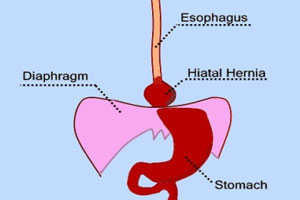Hiatal Hernia Vs. Hiatal Hernia Syndrome – Video
Anatomy & Symptoms of Hernias and Hiatal Hernia Syndrome
What you will learn about
Summary
In this video, Dr. Vikki discusses the difference between a hiatal hernia and Hiatal Hernia Syndrome. The hiatal condition occurs when the stomach pushes up through the opening of the diaphragm. Whereas the condition associated with the word syndrome refers to a subclinical variety where the stomach is spasmed and pushed up against the diaphragm. Among the symptoms of the syndrome: acid reflux, shortness of breath, heart palpitations, anxiety… and many others (to be discussed in a following session).
Transcript of the video
by Dr. Vikki Petersen
I wanted to talk to you today about hiatal hernia versus hiatal hernia syndrome. Some definitions first: the word hiatal comes from “hiatus”, a hole. The word hernia is something that comes through a hole inappropriately.
Types of hernia
A “hiatal hernia” is when the stomach pushes up through an opening that it shouldn’t, your esophagus or beside your esophagus; “umbilical hernias” occur around your belly button; “inguinal hernias” often come from straining, and they are located in your groin area. All these are hernias, something protruding through an opening that it shouldn’t.
The hiatal kind is when the stomach pushes up through the opening of the diaphragm. It can really widen that opening pretty dramatically, at which point you starting to get a large hiatal hernia. Sometimes, most of the stomach can be above the diaphragm; that’s where it becomes serious and needs surgery.
That’s not what we’re talking about here. We’re talking hiatal hernias that are small to moderate. The most common type (80% of them) are sliding hiatal hernias. The stomach comes up inappropriately, but then goes back down into position.
Anatomy of a hiatal hernia

With a hiatal hernia, what happens is that the stomach is spasmed. Then it’s pulled up because the stomach is connected to your mouth via the tube called esophagus. As the stomach spasms, it’s pulled up and kind of jammed up against your diaphragm.
In a nutshell, [when you have a] hiatal hernia, the opening has widened between the stomach and the esophagus, and a variety of symptoms can ensue.
The Syndrome
Now, my team and I have been heavily involved for the past 15 years in the area of “Hiatal Hernia Syndrome”. I’m going to define that in a moment. We’ve entered this field in a sort of unexpected way. People can have a very small or “subclinical” hiatal hernia. Small but its symptoms are devastating. People can be absolutely homebound; they can’t function because of a hiatal hernia that is either imperceptible or very small.
Counterintuitive, right? You think, “Oh, this big hiatal hernia… fine”. Then we have symptoms. In a subclinical hiatal hernia, sliding goes up, it comes back down, right up and down (80% of them are that). When I wrote the book “Hiatal Hernia Syndrome”, I named this “subclinical variety”: the stomach is not protruding through yet, but it’s spasmed; it’s pushed up on that diaphragm. And we called it a syndrome because the word syndrome means “a lot of symptoms coming together”.
Symptoms

Your stress hormones just act like the smoke alarm going off. When the smoke alarm goes off in your house, it scares the bejesus out of you. What’s the purpose? It’s supposed to go “Alert, alert, something’s wrong!”. Same thing with these stress hormones being secreted. Your diaphragm’s not moving freely. It’s pushing up on the heart a little bit, and the stress hormones are secreted to say, “Something’s up, I don’t know what”.
Meanwhile, you either wake up in the middle of the night, or even during the day, and you have panic attacks. Very disconcerting, frightening. A lot of times, it’s the heart palpitations or pressure in the chest that gets someone off to the ER. They go to the ER where they’re inevitably told “you’re fine” when it’s this causing it.
What we’re talking about here is a primary issue with Hiatal Hernia Syndrome, stomach spasmed, pushing on that diaphragm. Remember, it should be nicely relaxed. The stomach is a bag of acid. It should be nicely relaxed below the diaphragm so the diaphragm can function and the heart can function effortlessly… Instead, everything is pushed up on top of each other and you can experience heart palpitations, etc.
A treatable condition
I wanted to give you an overview today of what is Hiatal Hernia Syndrome and all the attendant symptoms. There’s actually 20 of these, and I’ll be going into those tomorrow.
This [condition] is absolutely something that’s affecting the person. If it’s not affecting you, you likely know somebody it’s affecting. And whether it’s acid reflux, GERD, pressure in the chest, trouble breathing, waking up in the night with a feeling of anxiety or sometimes choking on the acid, there’s a lot of manifestations to this.
The good news is it can be cured with a natural program. With compliance, it can be handled in a very high percentage of cases. We’re going to talk more tomorrow about the ins and outs of the symptoms.
• Click here to watch the follow-up webinar about the symptoms of Hiatal Hernia Syndrome.
• Discover the treatment proposed by Root Cause Medical Clinic for Hiatal Hernia Syndrome
Additional resources
Click to get Dr. Vikki’s book “Hiatal Hernia Syndrome”


